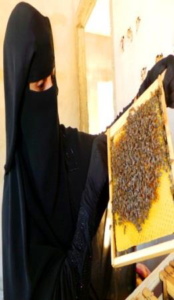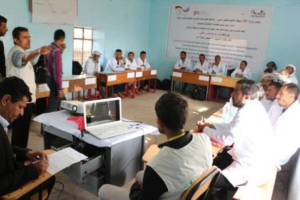Empowering Women by Ensuring Food Security and Breaking Stereotypes in Beekeeping

Yemen, one of the world’s poorest countries, has been affected politically and suffered from human crisis since March 2011, and later devastated by war since March 2015. Such crisis is pushing the country to the brink of famine. But where there is life there is hope. And hope still thrives in Yemen – thanks especially to the women of the country. The Global Program for Food and Nutrition Security & Enhanced Resilience (GPFNS-CPY) in Yemen carried out a number of interventions to improve the nutrition and food security situation of households at risk. Beekeeping is one of these interventions where the project provides training and start-up support to male and female heads of households to make their business as beekeepers. Within this intervention, the project gave high priority to the female-headed households to promote for gender equality and to break the community rooted stereotypes on women roles and beekeeping as only male profession. A high success was achieved through qualifying female beekeepers for the 1st time within the rural community in Ibb and Hajja governorates.
Context
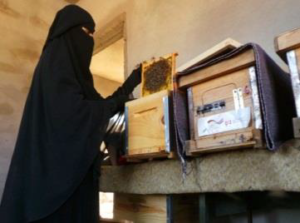
Conflict and Changing Gender Roles in Yemen
The prolonged conflict since 25 March 2015 made the life of people extremely miserable. According to the latest reports of United Nations, about 17 million people become food insecure and 6.8 million severely food insecure by 26 March 2017. A significant number of households become displaced and many of them lost their members particularly the productive members. Such conflict resulted also in increasing the number of female-headed households as many of their male breadwinners were killed or become disabled.
In a community where the role of women is limited to the non-paid works including housekeeping, childcare, farm works and cleaning, the situation become dramatically worse for women particularly those who are the heads of their households. Women become the responsible for securing income for the households and feeding the children, taking care of injured household members. This means that many women are taking on roles that are considered by the community as the domain of men. This is particularly difficult for women because of social barriers and limited access to resources. If women are unable to overcome cultural barriers to access essential humanitarian services and means of survival it leads to a severe risk of increased vulnerability, particularly for female-headed households.
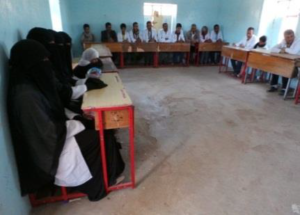
Gender in Beekeeping in Yemen
Women are traditionally the primary caregivers at the household level. Women have primary responsibility for cooking, cleaning, collecting water and firewood, and childcare. In comparison to men, women face higher disadvantages in particular in terms of mobility, access to productive assets, productive resources and access to market information with the result that they find it difficult to access and maintain profitable market niches and capture a larger slice of income for the household. Beekeeping is currently a male dominated business. As the beekeeping is a promoting business and generate cash, the males monopolized such activity till become a rooted tradition and women involvement in such activity is considered as taboo. Even if women become interested in learning and making business with beekeeping, the workload, little free time to either learn or practice beekeeping activities such as siting hives, apiary management, honey harvest, honey and bees processing. Training and providing start-up support to women is not enough. Gender awareness activities should be carried out to encourage women’s participation in such industry.
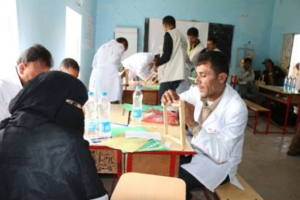
Promoting for Women Entrepreneurship
The Global Program for Food and Nutrition Security & Enhanced Resilience – Country Package Yemen (GPFNS- CPY) is a designed country package for Yemen that was developed out of a special initiative of the Federal Ministry for Economic Cooperation and Development (BMZ) called “One World – No Hunger”. This special initiative seeks to combat hunger and malnutrition in 11 countries in Asia and Africa, and Yemen is one of these countries. Some of the main GPFNS interventions are farm and non-farm livelihood activities. Beekeeping represents one of these activities that play a vital role in supporting poor households nutritionally, socially and economically. One of main ideas of the beekeeping intervention was to break down some of the stereotypes about women being “beekeepers”- even partly – in societies often blind to their needs and deaf to their voices. Women’s engagement in the beekeeping opened great potential for promoting women’s empowerment and contributed to reducing the poverty situation of their families. Thus, awareness activities and dialogue sessions were conducted with women to build their confidence on joining beekeeping business and such business can secure a significant income for their households. On the other hand, awareness activities and dialogues sessions were held with men to convince them about the role that woman can play if become entrepreneur in beekeeping and how that will help the man in providing the life requirements.
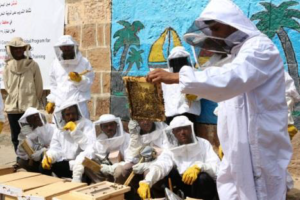
Beekeeping Project
The project targeted 80 men and women in Ibb and Hajja governorates based on pre-defined criteria. These men and women were trained on beekeeping that adopted the value chain approach, i.e., training inputs, honey production and purchasing. Women were giving the priority and encouraged to join the project during the registration processes while a high priority was given to the women-headed households. The project also promoted both gender empowerment, ensuring that women worked in the same roles as men. Both men and women served as producers, processors and marketers.
Sustainability was another major focus of the project. The project ensured the provision of 480 beehives with bees; empty cells; smokers made of tin with protection grid; soft brushes for bees; steel levers; face masks; leather hands gloves; galvanized wire rolls; stands for fixing the wax and boxes of 25 beeswax for each beekeeper as well as the basic set for starting the beekeeping production.
Within the project period, beekeepers strengthened their knowledge and skills. An average of 460 new apiaries were created. The success of this project relied on multiple factors:
Increased number of bee-swarms
Enhanced methods to combat pests
Exchanged experiences among beekeepers via “What’s Up”
communication channels and visit exchanges
Support in beehive repair
The planting of bee-friendly gardens around hives
Impact
Between July and September 2017, 80 household in the rural areas of Ibb and Hajjah governorates secured a source of regular income through establishing their beekeeping enterprises. Over the next two months, were given necessary support- technical and input- to improve their apiaries and honey production as well.
Improved beekeeping practices together with value chain traceability led to increased honey yields and enhanced product quality, which in turn created a sustainable income source for households through the creation of a market for their surplus crude honey.
The production process was not confined to honey but also included other products like bee wax and propolis (a traditional medicine), which are equally profitable. Actually, the price of propolis is much higher than that of honey. Organic beekeeping also provides beeswax and the honey can be used to produce other products like juices, medicines and cosmetics. It is recommended that farmers be educated on the multiple uses of honey product. The focus should be to train farmers to harvest honey and all associated by-products, namely, beeswax and propolis. Thus, more source of regular income over the year were derived from selling such previously value-added products.
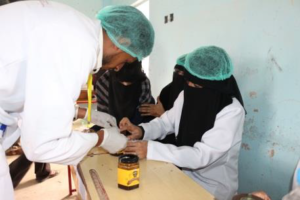
Traditionally, beekeeping in Yemen is a predominately male endeavor. This project and via its targeted beekeepers, introduced apiary skills to approximately 480 women in apiary activities. Those women participated in many activities that they previously avoided due to cultural constrains. Beekeepers’ wives and female relatives exchanged experiences in beekeeping, which led to increased number of apiaries and thus honey products and thus secured an income for approximately 800 family members.
About 560 men have learnt about beekeeping through apiarists’ gained knowledge and skills. The success of these beekeepers inspired other people in these communities to establish their own apiaries. Increasing the number of bees resulted in planting sustainable sources of nutrition for the bees, including the planting of aged trees, such as acacia.
The project introduced a collaborative network to the beekeepers (What’s Up), which allowed them to share best practices and experiences with each other. This network led to increased hive numbers and resources and reduced the risk of spreading diseases and infestations.
Vulnerable Households have secured both financial and nutritious sources for their families. The empowerment and enthusiasm this beekeeping project inspired in the beekeepers of Yemen was reflected in the word of one female apiarist, head of a household, who participated in this project: “I will be as a mother for my bees… I have three children and the fourth child is the bees.”
In short, this project confirmed that woman can play a vital role in improving the food security status of the household , if empowered to learn to work on their own and earn an income.
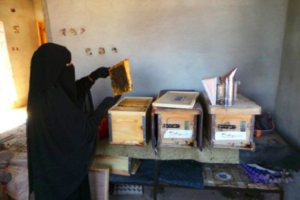
Success Factors
Beekeeping is one of the unprecedented projects introduced by the GPFNS- CPY for households in Ibb and Hajjah governorates. One of the immediate key success factors was breaking of stereotype in beekeeping. This has led to more understanding among the local communities of the important role woman can play in enhancing food security status of the households if she get the necessary support to create her own business.
Improved beekeeping practices together with the value chain, contributed to an increased household income not only because of increased yields but also because of the higher quality of honey produced. This growth is leading to growing demand for high-quality honey in the market and opening up new opportunities for up-scaling this project model into areas beyond the project sites .
Women apiarists are now a model for other households (both men and women) in the surrounding area and have earned respect for their courage, innovativeness and for being role models for other women to venture into beekeeping. This proves how women have overcome constraints related to existing gender norms and the challenges of working in a male-dominated enterprise .
Women’s experience and their role as a model beekeepers shows that integration of women into the beekeeping project has a positive effect on household income. The GPFNS – CPY has encouraged partnerships between women’s/men’s groups of beekeepers and the Honey Producers Associations to further strengthen the honey value chain as a whole. A revolving fund that can provide affordable input technology services to group members and embedded management skill training by the Honey Processors’ Association is now being explored to ensure the sustainability of the initiative .
Setting up an input supply mechanism for bee colonies and wax and also engaging in honey production simultaneously would enable more women beekeepers to generate higher income from beekeeping. And these groups would also help in increasing produce and enhancing access to markets thereby reducing instances of arbitrary selling of honey at low prices. Increased support to the initiative is expected to yield enormous benefits in terms of gender empowerment, value addition to products in the honey value chain and in improving incomes for the households .
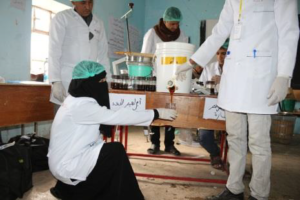
And More….. Success Factors…… In brief……
Prior to the project, beekeeping was assumed to only work for men. Now, women have proven that they can become beekeepers too.
Beekeepers asked GIZ for more advanced training courses in beekeeping.
Women’s success in beekeeping was considerably more apparent than men’s.
Individuals targeted by the project have now gained respect among their community, as they have become of great importance.
Cooperation with Partners and Sustainability
GPFNS-CPY worked for the implementation of the beekeeping project in collaboration with development partners, and at different stages of the project cycle.
Yemen Eye for Advisory Services & Exporting (YEASCO Global)- is a company with long history in the beekeeping business. It has a large capacity to process and export honey. Its business is created on the basis of value chain approach. It was selected by GPFNS-CPY to train 80 households, 40 in Ibb and 40 in Hajjah governorates. GPFNS-CPY supervised the implementation, and later followed up with the households. The beekeeping initiative was planned from the start with a clear division of roles and responsibilities for each of the stakeholders, and was carefully managed. This was a key factor to the successful implementation of the project.
GPFNS-CPY also coordinated with the “Ba’dan Association for Beekeeping and Development ” to provide the targeted beekeepers with any further advice and/or consultation. In order to secure a better yield, GPFNS-CPY supported the beekeepers by providing the beekeeping association with a honey extractor – a mechanical device used in the extraction of honey from honeycombs. It helps in removing the honey without actually destroying the honeycombs in the process.
The marketing issue was a challenge that encountered female beekeepers as they were not able to access local markets due to social constrains as well as lack of experience in selling their products. Nevertheless, the project linked them with private sector including YEASCO to buy the bees, the honey and wax from the beekeepers (men and women) based on the wholesale price in the market.

 GIZ Gender Website
GIZ Gender Website